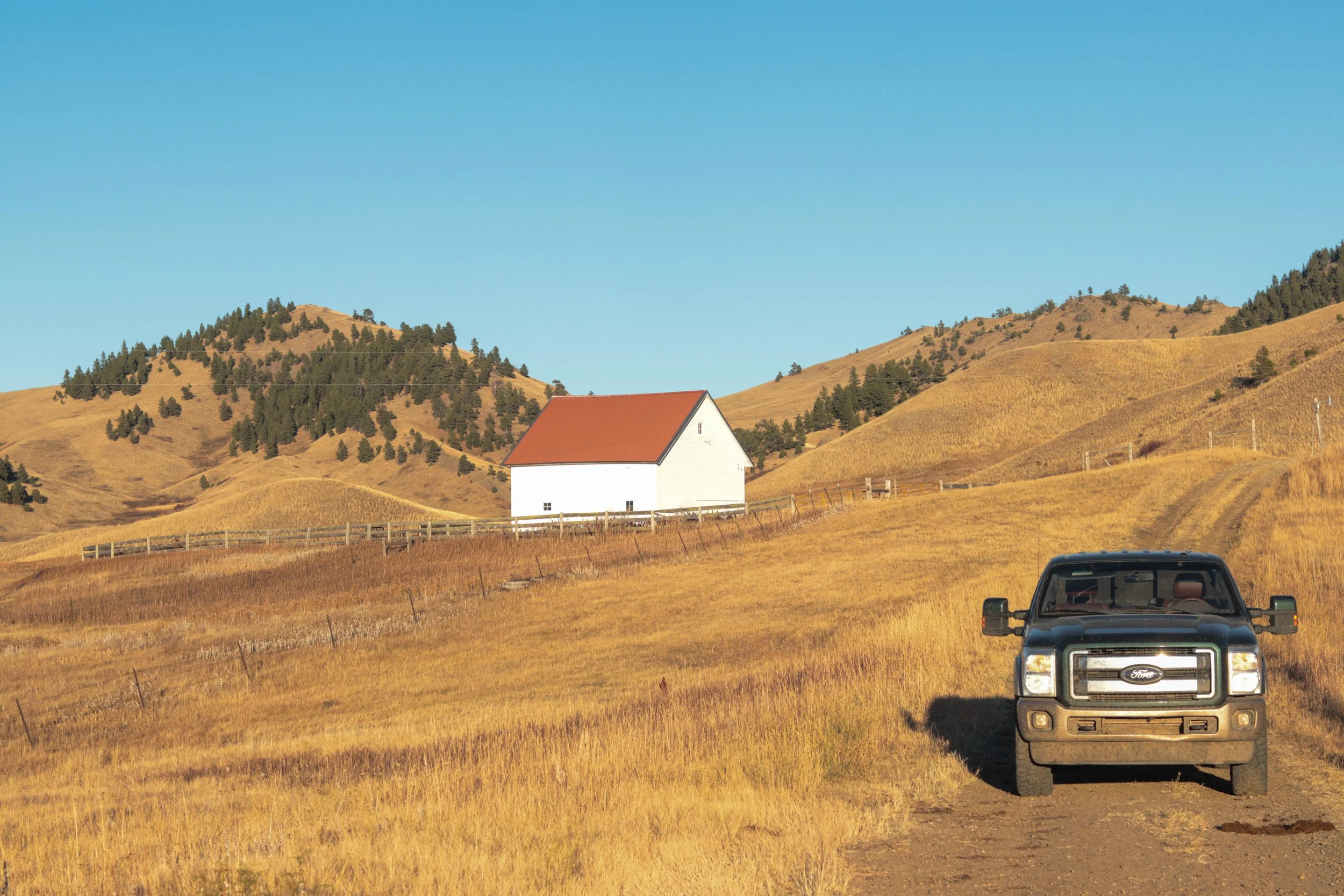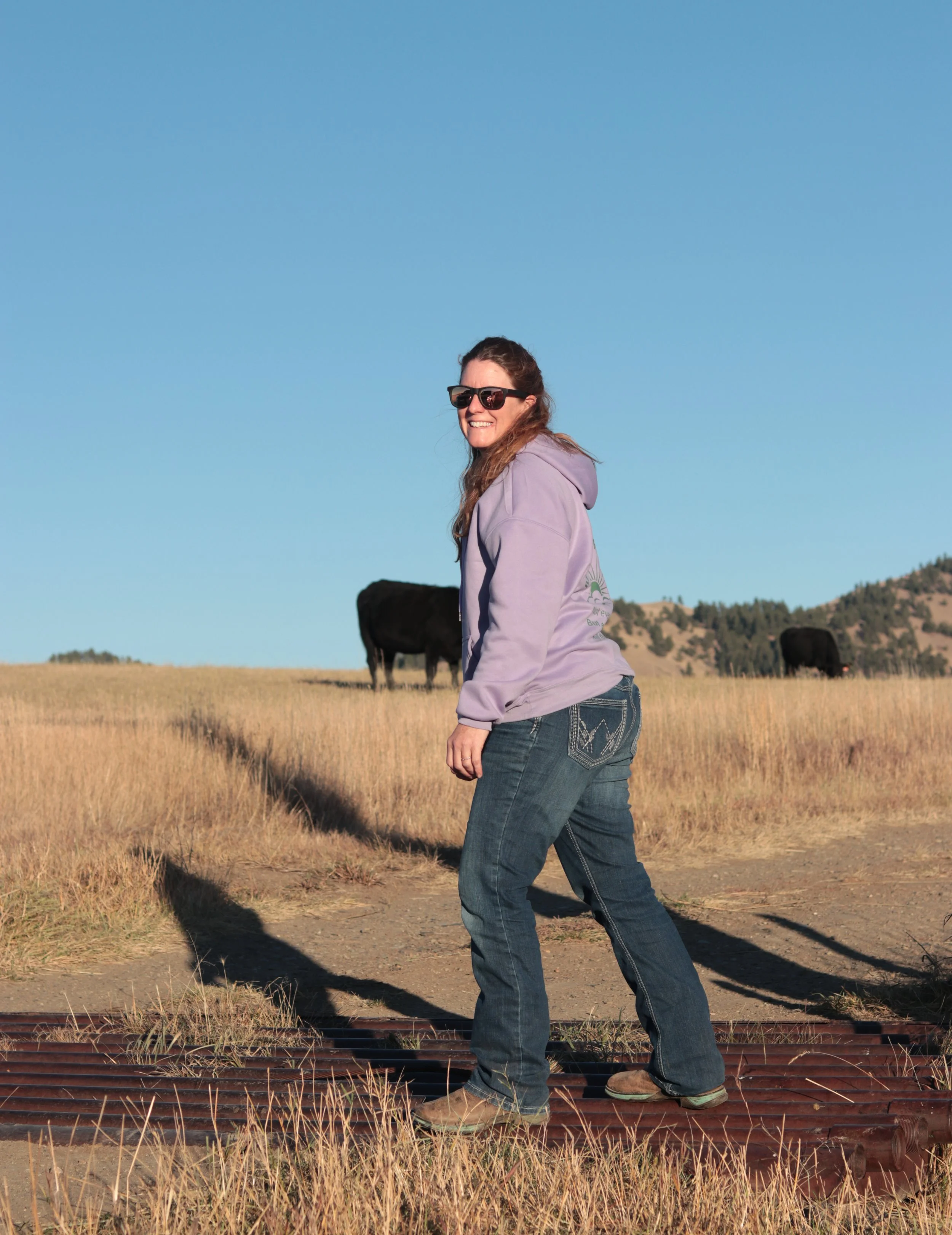
From Losing Home to Building Community: Abby Hall
Abby Hall’s pickup isn’t hard to recognize as a ranch vehicle- I have come to know the look of a pickup that spends more time on gravel and out in the pastures than on pavement. I pull up alongside her, and grab my camera and notebook out of the backseat of my own pickup. I greet her as I pull myself into the front seat, and she puts the Ford into gear. It’s a fifteen-minute drive from town to go check cows south of town, and once we hit the highway, Abby and I settle into an easy conversation about her family, how things are going on the ranch, and how she is dealing with the challenges of being a cattle producer in today’s economy. A federal employee by trade, Abby Hall is currently furloughed due to the government shutdown. Instead of working in the local Bureau of Land Management office, she can be found checking cows with her husband and chasing after her school-aged daughters. Abby graciously agreed to talk to me about how losing the “family” operation before she left home to go to college affected her, and how economic and family challenges are affecting her and other ag producers in our community. After attending a course called “Ask In Earnest” earlier this year, Abby has changed the way she interacts with those around her and is encouraging others to check in with their neighbors and to build community by sharing “pocket hugs” and starting conversations that go deeper than the weather.
Hi Abby! Are you sure you’re okay with me recording?
[Laughs] Yes. And you’re okay with me actually checking cows out at the Duke Place?
Yes, absolutely. I love it out there. So tell me about yourself.
My education is in Ag Technology, Ag Operations Technology, and Business Technology. That’s a four year Bachelor’s Degree from MSU-Northern here in Havre. I am currently a furloughed Rangeland Management Specialist for the BLM. I have worked for the BLM ever since I graduated college. I mostly deal with grazing range, cattle, occasionally sheep. Making sure animals are in the right pasture. Ensuring the people who have the privilege of a BLM lease are the ones using it, and are using it correctly. I also ranch with my husband. I have been married to Mike since 2010, and we have two daughters, Izzy and Zoe, who are 13 and 8 years old.
How did you get involved in agriculture?
I grew up in it, and farming and ranching are the only thing I’ve ever really known. I grew up as the fourth generation on the same place, even though my family didn’t own all of it. My great-grandmother homesteaded part of it, and part of it was passed on to my grandpa. A lot of the land was government/BLM land and some of it was leased. We had small grains, silage, 800 cows, and between 100-150 horses. It was a huge operation. But when I moved to Havre to go to college, the people who owned the place that we leased, ended up losing their textile business back in New Jersey. They decided to sell the ranch, and there was no way my family could afford to buy the place. My parents moved to Winifred, and I came to college bitter and angry. I intended to be an ag lender, which is why I have an ag business degree.
That’s really hard. How has that situation and being in agriculture affected your mental health or the health of those in your family?
I graduated [high school] in 1999, and that fall was when we lost the lease. It was absolutely traumatic. It’s terrible to be a college kid in a town you don’t know, and not be able to drive back “home”. My parents moved our house into Winifred, but it wasn’t the same. Some of our neighbors were going through the same thing, or couldn’t make it work anymore, and had to sell their places. It was just a terrible time. It was pretty dark and scary; but obviously I persevered and had fun, living up here [in Havre]. Mike was working out here for the Gregoire family, and when Giles [the patriarch] passed away, Mike was supposed to get part of the place. But that’s not how the lawyers executed the will. After we got married and had our first kid, it was just a lot of turmoil all over again. 2014 was the first year we were able to buy cows and equipment, and it was awesome. But then the market crashed in 2015, and thankfully, I’ve had my job with the government through the years. There’s just a lot of stress, especially when the government shuts down.
How do you handle all the stress that comes with this lifestyle?
At first, I just made myself keep going. I pushed through it, told myself I’m strong and smart. I tried counseling, but it was awkward. It wasn’t satisfying and didn’t feel helpful. I tried journaling, writing, and even tried medication one winter. I think it helped, but mostly, I just threw myself into my work. I am not good at relaxing. But now I do breathwork, and have learned about anxiety, and try to check in with others and stay close to family and friends. It helps that my kids keep me busy.
When you mention that you didn’t think a counselor helped, do you think it’s because they didn’t understand agriculture?
Yeah, totally, no connection. I felt like I was being judged. We weren’t a match. I do think that now, there are more counselors who get it here in Havre, but back then, there weren’t a lot of options. Thanks to Covid, now we have the technology option, so I guess there are more options out there.
How do you support others who might be struggling with some of these same challenges, especially your neighbors or friends who are involved in agriculture?
I believe in the sense of community- we are all in this together. I am on a kick right now where I want to make other people feel better. If I can check in or connect with them, it brings a smile to my face and makes me feel better. My Aunt’s sister makes these pocket hugs, and the girls and I have made it a fun mission to give it to people like you. It helps me recognize when people don’t seem themselves, and when I hand them the pocket hug, it makes them smile. It’s become a pretty big deal for us. We were asked to help make three hundred seventy for the Ronald McDonald House banquet this year, and made them for the Fifth Avenue Church.
It is kind of how we connect with others. I am learning to be more aware, and am taking some trainings to learn how to get better at having hard conversations with others. It also gives me something to do, and helps me manage my anxiety.
Do you think being part of agriculture makes it harder for us to ask for help when we need it, especially when our mental health is struggling?
Yes, like fifty thousand percent. I don’t think I’ve ever had a person in ag come to me and say they need help. I’ve taken the route of recognizing when people are off, or making it a point to go visit someone, and put out there that I am willing to listen. I am not a professional by any means, but I can listen. You can be there for when someone finally says they are having a really tough time, and you can offer resources to get them help.
Do you think there are resources in our community that producers don’t know about, or are worried about the stigma attached to them?
That’s a hard one. We all hear this stuff on the radio or online, but you maybe don’t really pay attention or wholeheartedly recognize it. A lot of people don’t think of those resources for themselves. You kind of just glass over, and think, yeah, that’s not me. I used to think we shouldn’t get in other people’s business, and lot of people are that same way. But now I see you don’t have to blatantly ask people what is going on- you can just say, jeez, you just don’t seem like yourself lately. Is everything okay? I went to a training called “Ask in Earnest” and that really hit me. Ask, but be willing to accept and know how to react if you do get that hard answer. Those of us in ag can bridge the gap, because we understand the challenges they are facing. We can start to build that community, and get them help if they are willing to take it.
Be prepared and have some resources you can share. I have changed my view; I used to think people would ask if they wanted help, but I don’t think that’s really working. A lot of people in agriculture aren’t really going to ask for help like that. If I ask them and talk to them, maybe I can help them. Like an old-time prayer chain, I can call someone and say this person needs help. Maybe that’s the best we can do.







